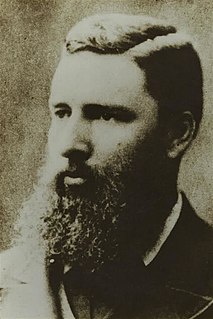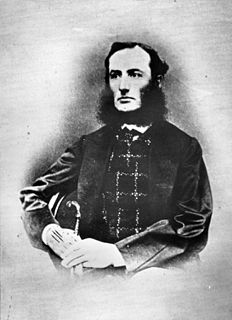Related Research Articles
New England and Macleay was an electoral district of the Legislative Assembly in the Australian state of New South Wales from 1856 to 1859, in the Northern Tablelands region of New England and part of the Mid North Coast region, including the area to the north of the Macleay River. but excluding the area south of the Macleay River which was included in the Counties of Gloucester and Macquarie. To the north was the electorate of Clarence and Darling Downs and to the west the electorate of Liverpool Plains and Gwydir. It elected two members, with voters casting two votes and the first two candidates being elected. It was partly replaced by New England.

Sir Joseph Palmer Abbott, was an Australian politician, pastoralist and solicitor.
Members of the New South Wales Legislative Assembly who served in the 12th parliament of New South Wales held their seats between from 1885 to 1887.</ref> Elections for the twelfth Legislative Assembly were held between 16 and 31 October 1885 with parliament first meeting on 17 November 1985. The Assembly was expanded from 113 to 122 members elected in 37 single member electorates, 24 two member electorates, 7 three member electorate and 4 four member electorates. The parliament had a maximum term of 3 years but was dissolved on 26 January 1886 after 14 months. The Premiers during this parliament were George Dibbs until 22 December 1885, Sir John Robertson until 26 February 1886, Sir Patrick Jennings until 20 January 1887 and Sir Henry Parkes.
Thomas George Rusden was a squatter and politician in colonial New South Wales. He was a member of the Legislative Council between 1855 and 1856 and a member of the Legislative Assembly for one term between 1856 and 1857.

David Buchanan was a barrister and politician in colonial New South Wales, a member of the New South Wales Legislative Assembly and later, the New South Wales Legislative Council.

Richard Stevenson was an English-born Australian politician.
William John Fergusson was a solicitor and politician from New South Wales, Australia.

William Consett Proctor was an English-born Australian solicitor and politician.

Thomas Michael Williamson was an Australian politician.

John Thomas Gannon was a politician and solicitor in New South Wales, Australia.
George Markham was an Irish-born Australian politician.

Abram Orpen Moriarty was an Irish-born Australian politician.

Charles Gilbert Heydon was an Australian politician and judge.
John Williams was a Crown Solicitor, politician and mayor in colonial New South Wales.
The Electoral district of Pastoral Districts of New England and Macleay was an electorate of the New South Wales Legislative Council at a time when some of its members were elected and the balance were appointed by the Governor. It was a new electorate created in 1851 by the expansion of the Legislative Council to 54, 18 to be appointed and 36 elected. The district is located in the north of the state and covered the Northern Tablelands region of New England and part of the Mid North Coast region, including the area to the north of the Macleay River, but excluding the area south of the Macleay River which was included in the Counties of Gloucester and Macquarie. To the north was the Pastoral Districts of Clarence and Darling Downs and to the west the Pastoral Districts of Liverpool Plains and Gwydir. Polling took place in the towns of Wellingrove, Armidale, Tenterfield, Walcha and Kempsey.
A by-election was held for the New South Wales Legislative Assembly electorate of New England and Macleay on 26 November 1858 because of the resignation of Abram Moriarty, for reasons that included the difficulty of serving a far distant electorate.
A by-election was held for the New South Wales Legislative Assembly electorate of the Clarence on 23 July 1863 because Clark Irving had been absent for an entire session without leave, having travelled to England seeking the foundation of a new Anglican Diocese of Grafton & Armidale.
New England, an electoral district of the Legislative Assembly in the Australian state of New South Wales, was created in 1859 and abolished in 1894.
A by-election was held for the New South Wales Legislative Assembly electorate of Tenterfield on 24 August 1874 because Robert Abbott had been appointed Secretary for Mines in the first Parkes ministry. Such ministerial by-elections were usually uncontested.
A by-election was held for the New South Wales Legislative Assembly electorate of Tenterfield on 3 December 1861 because Robert Meston resigned. Meston sent a letter to the Speaker of the Legislative Assembly which stated "As I find it very inconvenient for my affairs at present to attend on the very inopportune sittings of the New Smith Wales Parliament, I hereby resign my seat as representative of the Tenterfield electorate".
References
- 1 2 "Mr William Consett Proctor (1850-1905)". Former Members of the Parliament of New South Wales . Retrieved 26 June 2019.
- ↑ "The New England electorate: Mr Proctor's address". The Sydney Morning Herald . 5 January 1887. p. 7. Retrieved 12 May 2021– via Trove.
- ↑ "Supreme Court: Proudfoot v Proctor". The Sydney Morning Herald . 20 December 1886. p. 3. Retrieved 12 May 2021– via Trove.
- ↑ "Writ of election: New England". New South Wales Government Gazette . No. 739. 24 December 1886. p. 8769. Retrieved 12 May 2021– via Trove.
- ↑ "The nomination". The Armidale Express and New England General Advertiser . 7 January 1887. p. 4. Retrieved 13 May 2021– via Trove.
- 1 2 Proudfoot v Proctor [1887] NSWLawRp 90 , (1887) 8 LR (NSW) 459(14 November 1887), Supreme Court (Full Court).
- ↑ "Supreme Court: Proudfoot v Proctor". The Sydney Morning Herald . 17 December 1886. p. 3. Retrieved 12 May 2021– via Trove.
- ↑ "Supreme Court: Proudfoot v Proctor (part heard)". The Sydney Morning Herald . 20 December 1886. p. 3. Retrieved 12 May 2021– via Trove.
- ↑ "Mr. William Cleghorn's meeting". The Armidale Express and New England General Advertiser . 7 January 1887. p. 4. Retrieved 12 May 2021– via Trove.
- 1 2 Green, Antony. "Index to Candidates: Chedid to Coady". New South Wales Election Results 1856-2007. Parliament of New South Wales . Retrieved 12 May 2021.
- ↑ "Mr Givney at Walcha". The Armidale Express and New England General Advertiser . 4 January 1887. p. 4. Retrieved 12 May 2021– via Trove.
- ↑ "Mr. Proctor's Meeting". The Armidale Express and New England General Advertiser . 4 January 1887. p. 5. Retrieved 13 May 2021– via Trove.
- ↑ Green, Antony. "1887 New England by-election". New South Wales Election Results 1856-2007. Parliament of New South Wales . Retrieved 22 October 2019.
- ↑ Green, Antony. "1887 New England". New South Wales Election Results 1856-2007. Parliament of New South Wales . Retrieved 29 September 2020.
- ↑ Twomey, Anne (2004). The Constitution of New South Wales. Federation Press. pp. 414. ISBN 9781862875166 . Retrieved 12 May 2021.